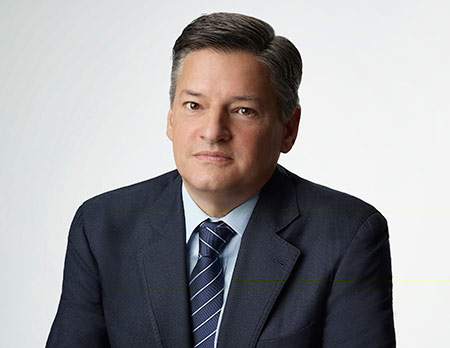TCA: Sarandos: Netflix Staying Out of Ratings 'Arms Race'

The smarter way to stay on top of broadcasting and cable industry. Sign up below
You are now subscribed
Your newsletter sign-up was successful
Complete Coverage: TCA Winter Press Tour
Pasadena, Calif. -- It's become enough of a ritual that Netflix Chief Content Officer Ted Sarandos kicked off the Q&A portion of his TCA executive session with this line: “And now to your question on ratings and why we don't talk about ratings."
The quip drew a laugh but the press kept pressing the issue, especially given that networks like NBC and FX had just taken shots at Netflix, with NBC research guru Alan Wurtzel even releasing third-party data on Netflix viewing.
Sarandos waved off the Wurtzel reveal as “really remarkably inaccurate data,” adding, “the methodology and the measurement doesn’t reflect any sense of reality of anything we keep track of.” Getting a further shot in, he asked, “Why would NBC spend their lunch slot with you guys talking about our ratings? Maybe because it’s more fun than talking about NBC ratings.” As to his previous assertion that Orange is the New Black is more popular than rival linear shows, he said, “There’s not an apples-and-apples comparison between Netflix watching and other viewing.”
While the 30-minute session also covered some of the 600 hours of programming Netflix plans for 2016, including new seasons of Jessica Jones and the debuts of Black Mirror and Withholding ratings only reasserted the company's belief in withholding numbers for the creative community's own good, Sarandos maintained.
"Once we give a number for one show, everything will be benchmarked off that show," he said. "We may build a show for 2 million people and another show for 30 million people. [Releasing ratings] puts a lot of creative pressure on the talent that we don't want to. We think that if a show performs over the long run, which is how we invested in it, it's successful. If we turn it into a weekly arms race by doing box scores of every live-plus-3 or live-plus-7, I think it's going to have the same result that it has for television, which has been remarkably negative in terms of the quality of shows."
One metric he did cite as evidence of the popularity of Netflix programming was growth in subscribers. “If we were spending a lot of money on shows people weren’t watching, they’d cancel,” he said. Unlike any of the other companies presenting here, you can cancel Netflix with one click. Try calling your cable company and getting rid of a channel you’re not watching.”
The smarter way to stay on top of broadcasting and cable industry. Sign up below
Sarandos, in the first of 14 sessions during a packed all-Netflix day at TCA winter press tour, also detailed the company's international expansion and itemized some of the $6 billion in content spending projected for 2016, saying the investment in originals is gaining as a percentage of the whole, as acquisitions decline.
FX Networks chief John Landgraf took aim at Netflix’s thin profit margins and heavy content spending during his executive session, which Sarandos noted, though he did not name Landgraf. Asked about whether the spending eventually will have to slow as profitability becomes more of a focus, he shrugged, “The profitability of the company is driven by the expansion of our international base.”
At CES earlier this month, he and CEO Reed Hastings used a keynote slot at the show to tout their availability in 190 countries, essentially everywhere except China. The company, which reports earnings Tuesday, currently has 70 million worldwide subscribers, 43 million in the U.S. Sarandos has said that the U.S. will ultimately represent about 20% of the global base.
Sarandos was asked after the session about reluctance by some studios to grant global rights to content and thereby enable Netflix's global rollout, out of a fear that it will result in an even bigger disruption to their businesses than has already occurred Stateside.
"I don't think it's up to anyone what does or doesn't get built. It's a competitive marketplace and as long as you can pay top dollar to the content, they're going to chase top dollar for the content," said. "The risk of all this, selling the content isn't a profit center for a studio or a network. So if you want to turn a profit center into a cost center by artificially propping up other businesses, it doesn't make much sense in the long term." During his on-stage Q&A, he asserted the ultimate goal is "for Netflix to be the same around the world ... it may take a few years to get there."
